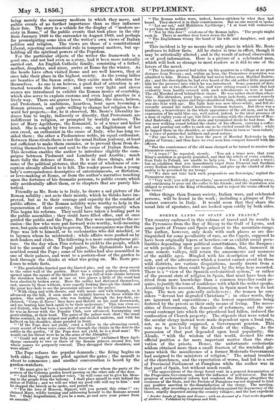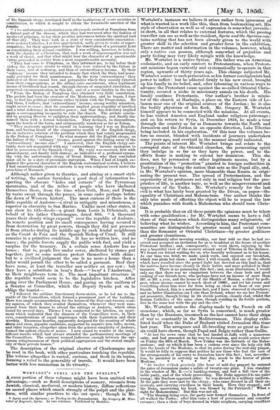BORDER LANDS OF SPAIN AND FRANCE. * THE country embraced in
this volume of travel and its results is the Pyrennees from the Bay of Biscay to the Gulf of Lyons, and some parts of France and Spain adjacent to the mountain-range. The author, however, only deals with such places as are dis- tinguished for some peculiarity of race, as the Cagots, supposed to have been originally lepers or heretics—or as exhibit social pecu- liarities depending upon political constitutions, like the Basques ; or with peoples, if they are more than clans, that, immured in some remote valleys, still retain the amusements and manners of the middle ages. Mingled with his description of what he saw, and of the adventures which a tourist cannot avoid in those -wild districts, are various disquisitions, mostly drawn from a wider experience than could be gained by the trips here recorded. There is a "view of the Spanish ecclesiastical system," or rather of the present state of religion in Spain, that must have been de- rived from more knowledge than a common traveller could ac- quire, to justify the tone of confidence with which the writer speaks. According to his account, Romanism in Spain must be on its last legs. The men are generally unbelievers; the women he con- siders "devout but degraded. Christians " ; in other words' they are ignorant and superstitious ; the lowest superstitions being fostered by the priests as their only means of living. The neces- sities of Government, the demands of reformers, and the uni- versal contempt into which the priesthood had fallen, induced the confiscation of Church property. The stipends that were voted to the secular clergy instead were made dependent upon a local rate, not, as is generally supposed, a Government pension. This rate was to be levied by the Alcade of the village. As the possession of that post depended upon local popularity, the Alcade, "with the wisdom of this world, deemed his own official position a far more important matter than the star- vation of the priests. Hence the unfortunate ecclesiastic seldom obtained more than a small fraction of the wretched pit- tance which the munificence of a former Moderado Government had assigned to the ministers of religion." The actual troubles of the churchmen, and the expectation of worse, had led to a sort of Provincial Parliament at Pamplona while the author was in that part of Spain, but without much result.
"The aggravations of the clergy found vent in a general denunciation of the Progresista Government, under the influence of self-interest. But the progress of ecclesiastical reform had rendered the Bishops altogether the creatures of the State, and the Prelate of Pamplona was not disposed to lend any positive sanction to the dissatisfaction of the clergy. The meeting, therefore, after recording a general malediction against the degeneracy of the times, angrily dispersed among the country villages ; and the last expedient • Border Lands of Spain and France : with an Account of a Fieit to the Republic of Andorre. Published by Chapman and Hall.
of the Spanish clergy developed itself in the institution of secret societies or conspiracies, to which it sought to obtain the formidable sanction of the Jesuits.
wo unfortunate ecclesiastics soon afterwards arrived at Pamplona from a distant part of the diocese, which they had traversed after the fashion of mediwval pilgrims, to lay their .peculiar grievances before the spiritual lord of that city. They were both in a state of very considerable emaciation : over-zealous Catholics, I at first apprehended, sadly given to works of super- eregation ; for their appearance bespoke the observation of a perennial Lent as constituting their normal condition. I was willing, however, to believe, -with the charity of a Christian, that such a work of supererogation was not a work of choice, and that what might bear the character of a questionable virtue proceeded in reality from a most unquestionable necessity. "They had come to Pamplona, as they informed me, to lay before their oishop the desperate straits to which they were reduced by the failure in their cures, first of ordinary, and then of extraordinary income. By their 'ordinary' income they intended to denote that which the State had nomi- nally provided for their maintenance. By the term 'extraordinary' they indicated all those casual fees and perquisites which they usually extorted from their congregations as the ultima ratio sae,erdetum when legitimate means of livelihood had Ceased, through threats of suspended absolution, of perpetual excommunication in this life, and of a worse fatality in the next.
" From the Bishop of Pamplona they obtained very little consolation. The prelate had been the creature of the Moderados, and he began, I dare say, to find his political relations rather ticklish with the Progresistas. He told them, I believe, that ' extraordinary ' income, among worthy ministers, ought never to cease ; that its cessation implied great stupidity of intellect and a total deficiency in inventive power; and that this deficiency implied again a corresponding incapacity to rule the church. The prelate conclu- ded by praying Heaven to enlighten their understandings, and finally dis- missed them with a formal benediction. They declined, in discomfiture, upon the hotels of the town, and subsequently wandered as far as Tolosa.
They anxiously applied to myself on learning that I was an English- man, and having heard of the comparative wealth of the English clergy, for an inductive solution of the problem which they had vainly propounded to the Bishop of Pamplona. In what manner did the English clergy, on the failure of the 'ordinary' income, guard against the falling away of the 'extraordinary' income also ? ' I answered, that the English clergy cears tainly were not acquainted with any 'extraordinary' income analogous to that in possession of the Spanish clergy. My reply was received, first with astonishment, and finally with dismay, as indicative of a profound sympa- thy with the unfortunate clergy of Great Britain who they concluded must all be in a state of proximate starvation. When I had at- length ex- plained the general character of the English ecclesiastical system, I. believe I had unintentionally created converts to my own religious creed under the preaching of Mammon."
Although rather given to theorize, and aiming at a smart style of writing, the author furnishes a good deal of information re- specting the obscure "holes and corners" of the Pyrennean mountains, and. of the tribes of people who have sheltered themselves there from the time when Goth, Moor, and Frank, by turns swept trough the passes in some eases perhaps • before the dawn of Western history. The most curious of these is the little republic of Andorre—a rival in antiquity and minuteness, a superior in obscurity to San Marino. Unlike most other states, it can show its title-deeds—a, grant from Louis le Deborman., on behalf of his father Charlemagne, dated 805. "A thousand years their cloudy wings expand" over the republic of Andorre ; its remote position and its small consequence having secured it from destruction by great powers, though they did not preserve it from attacks during its middle age by such feudal neighbours as.the Count de Foix and the Spanish Bishop of ITrzel.. It still remains in a primitive condition. It has no written law, and no taxes ; the public forests supply the public with fuel, and yield a surplus for the treasury. In a certain sense Andorre has no house ; that is, people live under cover, sheltered by stones put together, just as some nations protect themselves with skins ; but to a civilized judgment the one is no more a house than a tailor would permit the other to be called a garment. Beef they have none, at least the traveller saw neither ox nor cow ; but they have a substitute in bear's flesh—" bceuf a PAndorrane,". as their neighbours term it. The most important structure in the republic would seem to be the legislative kitchen. After going over the Parliament House, and gazing on the uniform of a. Senator or Councillor, which the Deputy Syndic put on to oblige the tourist— "I followed the sublime functionary down-stairs, as he led me to the stable of the Councillors which formed a prominent part of the building. Here was ample accommodation for the horsesof the four-and-twenty coun- try squires, of which they availed themselves, whenever they were sum- moned from their homes to attend the sittings at Andorre, which often lasted for several days. Thence I was conducted to the kitchen, an apart- ment which indicated that the dinners of the Councilors were, in their eyes considerations of equal importance with their legislation and their worship. Enormous hearths, apparently designed for the roasting of whole sheep and oxen, gigantic cauldrons, supported by massive iron bolts, stoves, and other luxuries, altogether alien from the general simplicity of Andorre, formed the salient objects of notice. I now ceased to wonder at the insig- nificant results which had always attended the parliamentary meetings of theGouncillors. The contrast seemed ludicrous enough between the epi. eurean voluptuousness of their political aggregation and the stoical simpli- city of their private homes."
The description of the original charter of Charlemagne may be read in the book, with other particulars touching the republics. The volume altogether is varied, curious, and fresh in ita topics, forming a relief to the generality of travels. It would have been better-with less mannerism in its vivacity.







































 Previous page
Previous page